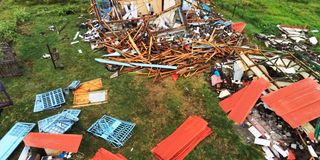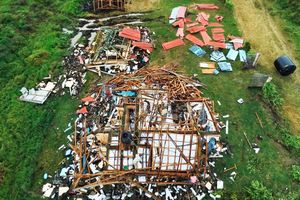
If you hold land tainted by controversy — or acquired property through irregular or unprocedural means — it’s time to be very afraid.
If you hold land tainted by controversy — or acquired property through irregular or unprocedural means — it’s time to be very afraid.
That warning extends even to President William Ruto, whose Weston Hotel sits conspicuously on a public parcel along Lang’ata Road. It also goes to those attempting to get the land meant for the expansion of Nairobi’s Ruai Sewerage Treatment Plant. Here is why.
The Supreme Court, on April 11, 2025, in Harcharan Singh Sehmi versus Tarabana Company pronounced, with finality and authoritative clarity, that the doctrine of the Innocent or Bona Fide Purchaser for Value Without Notice cannot be invoked to shield or sanitise illegality or irregularities associated with land titles. The apex court has emphasised that this equitable doctrine, while designed to protect purchasers acting in good faith and without knowledge of defects, cannot be extended to confer legitimacy upon titles tainted by fraud, illegality, or procedural impropriety. In essence, what the court is saying is that the doctrine cannot be used as a legal mechanism to launder illegality or insulate unlawful transactions from judicial scrutiny.
Let me use the Ruai land to illustrate.
The 1,643-acre parcel of land in Ruai was originally acquired from the Embakasi Ranching Company with a singular purpose: the future expansion of the Ruai Sewerage Plant — a critical component of Nairobi’s long-term urban infrastructure planning. This designation as public utility land, and this is public knowledge, means it was never meant for private settlement or commercial development.
The legal position, held by courts, is that if land acquired through compulsory acquisition is not to be used for the intended purpose, it should revert to the original owner. This was meant to deter situations where the government paid for compulsory acquisition with the intention of using the land for patronage.
This is what the law says: “If, after land has been compulsorily acquired, the public purpose or interest justifying the compulsory acquisition fails or ceases, the [Land] Commission may offer the original owners or their successors in title pre-emptive rights to re-acquire the land, upon restitution to the acquiring authority the full amount paid as compensation.” This did not happen in the case of Ruai. Instead, we are dealing with an outright irregularity by all the claimants.

Police officers oversee the repossession of the grabbed Dandora Estate sewerage treatment land in Ruai, Nairobi, on April 22, 2020.
One wishes that the likes of Muhuri Muchiri, the former Embakasi chairman was still alive to narrate that story, though documents speak louder than individual memory.
What is particularly startling is that, earlier this month, a private company — reportedly linked to President William Ruto — obtained a court order suspending an earlier ruling that had allocated a substantial portion of the disputed Ruai land to squatters.
Although the legal battle over this public land is still ongoing, it is imperative to state — unequivocally — that neither the squatters nor the company now asserting ownership has a clear, legitimate claim to the land.
The historical record pertaining to the handover of this land to the public by Embakasi Ranch is straightforward. What is riddled with irregularities and questionable motives is the processes by which this land was repossessed and redistributed to politicos.
Before he left power, President Uhuru Kenyatta took back this land citing public interest and the need to safeguard Nairobi’s long-term sanitation plans. However, this decision was later reversed through a gazette notice signed by [now deputy president] and then Interior Cabinet Secretary Prof Kithure Kindiki, exposing the level of impunity within Kenya’s ruling elite.
It is against this backdrop that we should look at the Supreme Court ruling. It means that potential buyers for such land, or anyone attempting to purchase, or occupy, this land is effectively gambling with their money.
Buyers should take note of a significant shift in Kenyan jurisprudence regarding land ownership. Under the now-repealed Section 23 of the Registration of Titles Act, a certificate of title was considered conclusive proof of ownership. Merely possessing a title offered near-absolute protection to the holder—even in cases where the land had been acquired through irregular means—unless fraud or illegality could be directly attributed to the titleholder. This meant that individuals were shielded from the consequences of irregularities committed by government officials during the allocation process.
However, the Supreme Court has made a critical departure from this position. Under Section 26 of the current Land Registration Act, a title now serves only as prima facie—that is, on the face of it—evidence of ownership. Courts are no longer at liberty to turn a blind eye to the irregularities or improprieties surrounding land transaction.

A signpost erected on a road leading to the Dandora Estate Sewage Treatment Land in Ruai, Nairobi, on April 27, 2020.
In essence, the Supreme Court has drawn a firm line in the sand: a title deed holds legal weight only if it is the result of a lawful, transparent, and procedurally sound process. Anything short of that renders the title deed meaningless and not worth the paper it is printed on.
More so, the Supreme Court affirmed that where land allocation is marred by what it terms “incurable procedural irregularities,” the resulting title is null and void from the outset. In such cases, such a title is not available for transfer and any subsequent transactions is an illegality. In the past, fraudulently acquired public land would often be flipped several times, allowing final purchasers to plead ignorance and invoke the protection of the “innocent purchaser for value” doctrine.
The court has also reaffirmed two critical principles: first, that time does not cure illegality. A land transaction that begins in fraud or irregularity cannot be made lawful simply because years have passed or a structure has been erected. Second, we know from previous Supreme Court rulings, is that government land — land reserved for public use, utilities, or held in trust for the people — remains immune to claims of adverse possession. One cannot simply occupy public land and later assert ownership based on prolonged use.
In an earlier ruling in the Dina Management Limited case, which touched on President Daniel arap Moi, the Supreme Court held that illegally or irregularly allocated public land cannot be laundered into legality through private transactions, regardless of the buyer’s innocence or ignorance.
Reading some of the affidavits in the Weston Hotel case, the Ruto family claims to have been innocent buyers and that they did not know that this was public land. What the Supreme Court ruling says is that the failure to “notice” or the lack of background knowledge on existing claims on a piece of land cannot justify an illegality. This is crucial: illegality is not something a buyer can simply plead ignorance of to gain protection. Therefore, “innocence” does not equate to legality.

Demolished buildings on May 16, 2020, of people who bought land next to a controversial 3,000-acre plot to pave the way for the expansion of the Dandora Sewage Treatment Plant in Ruai, Nairobi.
I have used these two cases since no amount of political dance can cure an ailing title. The other reason is that the burden has shifted to the buyer and good faith is no longer a defence. The ruling reinforces the idea that title must not only be held but be legitimately obtained, and that no subsequent good-faith purchase can remedy an original illegality.
This ruling marks a jurisprudential shift toward stricter accountability in land transactions, particularly involving public land. It sends a clear warning: land rights cannot be legitimised through procedural gymnastics or claims of ignorance. It also strengthens legal safeguards for public land by reaffirming that titles must be not only procedurally acquired but lawfully grounded. The era of “good faith” as a shield for illegal land dealings is, in theory at least, being closed by the judiciary.
In the case of Harcharan Singh Sehmi versus Tarabana Company and others, the Supreme Court concluded that … “there can be no protectable purchaser of an illegal title without notice of such illegality.” Finally, it has ordered Tarabana to demolish a multi-storey building in Ngara. A precedent has been set.
John Kamau is a PhD candidate in history, University of Toronto. Email: [email protected]; On X: @johnkamau1








